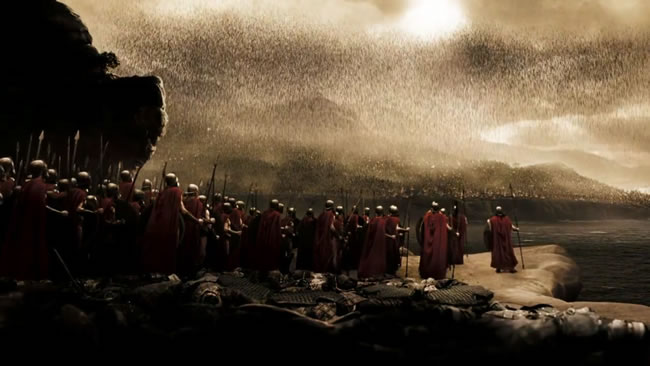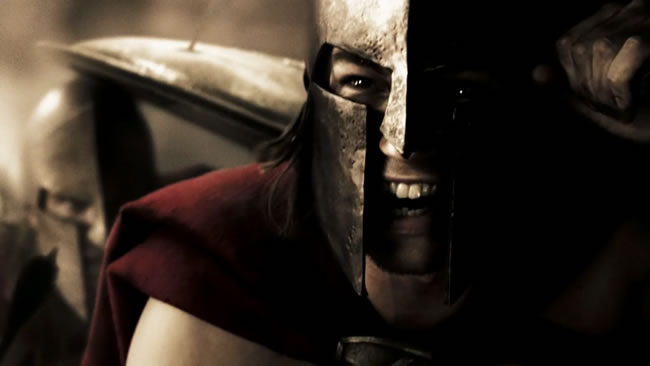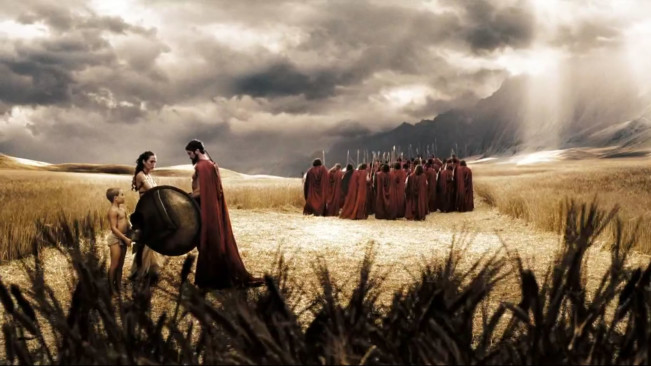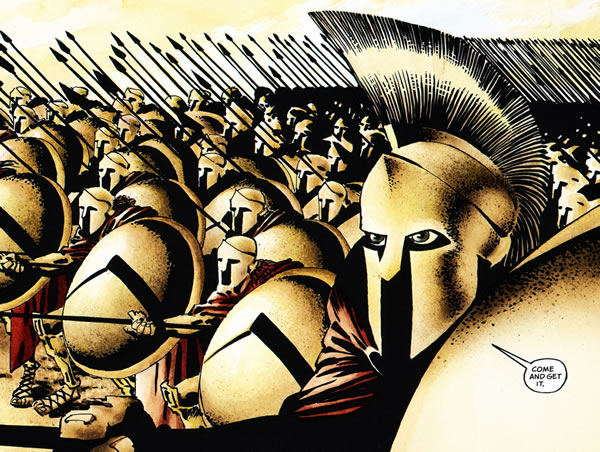
While there is plenty to say about the breakthrough filming style of 300 that has since been imitated to death, the real legacy of the movie is the quotable dialogue. Numerous one-liners have infiltrated popular culture, as “This is Sparta!” has become arguably as popular as “I am your father.”
The real beauty of the eminently quotable 300 is that much of the dialogue comes straight from the Greek and Roman classics about the Spartans and the Battle of Thermopylae (480 BC). While Frank Miller’s graphic novel was the conduit, he was true to much of the source material.

When a wounded Persian tells a Spartan that their “arrows will blot out the sun,” the Spartan smugly grins, “Then we will fight in the shade.” The same line comes from straight from Herodotus (7.226.2) who seemingly found the anecdote as funny as the filmmakers, who later depict the Spartan laughing about it while under a hail of arrows. Herodotus, who was but a toddler during war with the Persians, tells us that people remembered the Spartan—Dieneces—for such quips. More than 500 years later, Plutarch would attribute the famous line to Leonidas.

In a more somber scene, Leonidas’s wife, Gorgo, dramatically tells her husband to “come back with your shield or on it.” The notion was that a Spartan should never abandon his main weapon during battle. If he could not bring it back victorious, then surely he had died and he would be carried upon it instead. While there is no record of Gorgo saying this, Plutarch attributed the words to a Spartan mother who handed her son his shield saying, “Son, either with this or on this.” Consequently, Spartans were typically buried on the battlefield, but again, Plutarch was covering a subject hundreds of years old.

Regardless, Gorgo was every bit the spitfire that the 300 film portrays her (the graphic novel hardly mentions her). Early in the movie when she interjects during a discussion between Leonidas and a Persian ambassador, the Persian indignantly asks, “What makes this woman think she can speak among men?” Gorgo blurts, “Because only Spartan women give birth to real men.” The original story again came from Plutarch who said it was a Greek woman who asked Gorgo why she thought women could rule men. The answer was the same.
Among the dramatic battle cries in 300 is “Come and get them!” when Leonidas responds to the Persian demand to lay down their weapons. The popularity of these words predate 300, as they have found their way onto battle flags and even tattooed on my friend’s arm, in Greek of course—ΜΟΛΩΝ ΛΑΒΕ. These were the exact words Plutarch put in Leonidas’s mouth in retelling the story of Thermopylae.

Plutarch is also the source Leonidas’s overly dramatic command to his troops to “Ready your breakfast and eat hearty for tonight we dine in hell!” Of course, the Greek translates to dining in Hades, not hell. While this may seem to be the less sophisticated of the classical quotes, consider that even the great orator Cicero enjoyed this and other sayings of the Spartans. ((Cicero, Tusculanae Disputationes, translated by George Alexander Otis (Boston: Mes B. Dow, 1839), 75.))
A year after the battle, a Spartan recounts the story of Thermopylae at a campfire, “May all our voices whisper to you from the ageless stones, ‘Go tell the Spartans, passerby, that here by Spartan law, we lie.’” Of course, that law was fighting to the death. Herodotus found the inscription on a monument to the battle (7.228.2), making the phrase at least nearly 2500 years old. While no ageless stone bearing the saying survives today, the inscription is on a modern monument at Thermopylae.
This is just a sampling, but 300 is full of quotes directly from classics, some more than two millennia old. Of course, the Spartans had a style of speaking that was short and memorable (and suited for Twitter!).
The fact that many of these phrases have found their way back into popular culture is a testament not only to 300 and the filmmakers’ decision to rely on classical words, but also to the speaking style of the Spartans.
